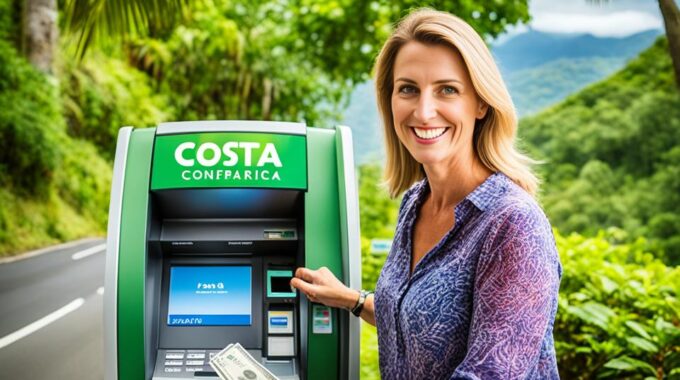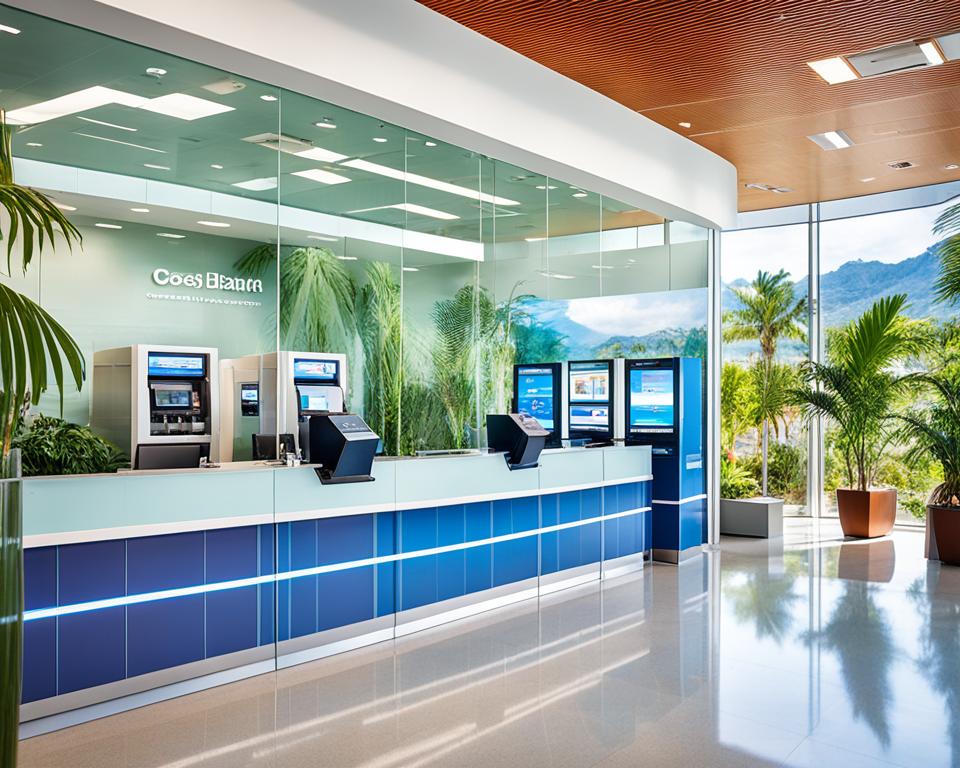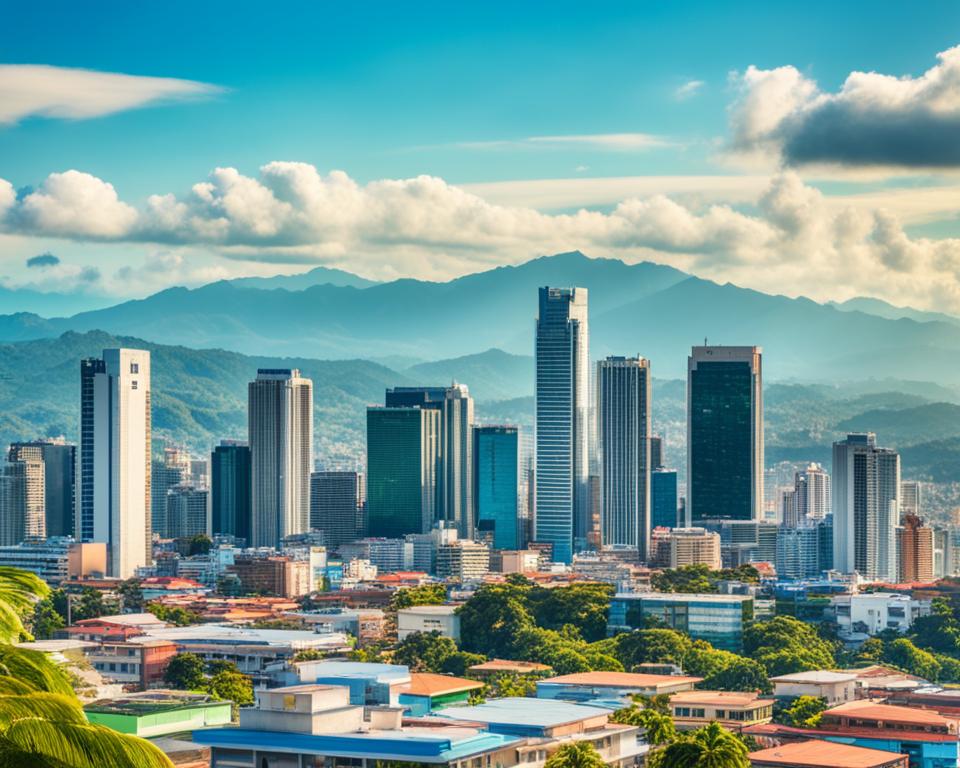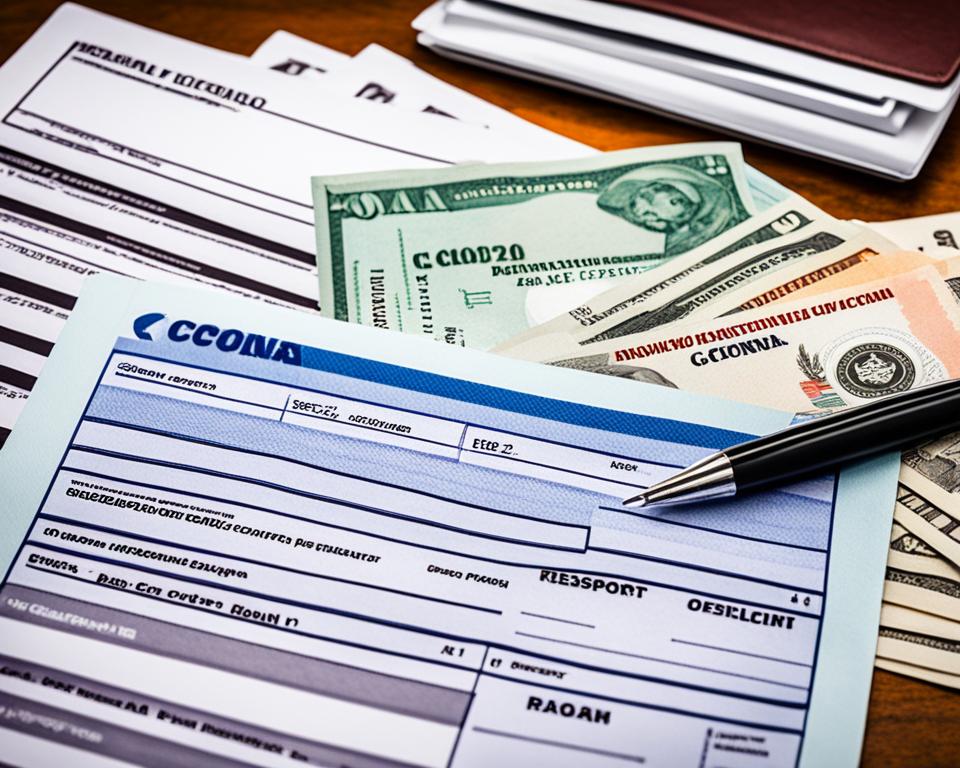GAP Investments provides tailored financing solutions for investors in Costa Rica, understanding the unique needs…

Costa Rica Banking for Expats: Guide for Foreigners
Living in Costa Rica as an expat means understanding its banking system. This guide will help you open a bank account. It will cover the steps, types of accounts, and what documents you need. By knowing these, expats can easily set up their financial life here.
Key Takeaways
- Understanding the banking system in Costa Rica is essential for expats to make informed decisions.
- Residency requirements vary among banks, with some allowing non-residents to open accounts with restrictions.
- Choosing the right bank, whether state-owned or private, is crucial based on factors like branch availability, accessibility, language support, and services offered.
- The process of opening a bank account in Costa Rica involves gathering necessary documents, visiting the bank branch, and completing the application.
- Expats in Costa Rica must comply with income tax rules and report all worldwide income to the IRS in the United States.
Understanding the Banking System in Costa Rica
Costa Rica has implemented strict regulations to fight financial crimes and maintain transparency. Its banking system meets global standards. They work with worldwide agencies to stop money laundering. This makes expats more confident in using Costa Rican banks.
Compliance with International Standards
Costa Rica follows global banking rules to avoid illegal financial use. Financial bodies in the country work with international groups for transparency and against money laundering. This helps expats feel safe when handling their finances.
Transparency and Anti-Money Laundering Measures
Costa Rica focuses on transparency and strong measures against money laundering. Its banks must know their customers well, watch transactions, and report any doubts. These efforts boost the Costa Rican banking system’s trustworthiness, reassuring expats.
Restrictions and Conditions for Foreigners
The banking system in Costa Rica welcomes expats, but there are rules. Requirements differ by bank. While some banks need you to live there, others, like Banco de Costa Rica, let you open an account without living in Costa Rica. It’s important for expats to know and follow these rules.
Residency Requirements for Opening Bank Accounts
Opening a bank account in Costa Rica has varying residency needs based on the bank. In 2016, Banco de Costa Rica (BCR) made it easier for non-resident foreigners to bank there. This change helps expats without legal residency access international banking in Costa Rica.
Banco de Costa Rica’s Non-Resident Policy
When non-resident foreigners could start accounts at Banco de Costa Rica, it changed the game. This shift allows international citizens to have a financial foothold in the country, even without residency.
Other Banks’ Residency Requirements
Yet, not every Costa Rican bank has followed BCR’s lead. Some may require that account holders are legal residents of Costa Rica. Before deciding on a bank, it’s crucial for expats to check their chosen bank’s specific residency requirements.
Knowing the varying residency policies at Costa Rican banks helps expats choose wisely. This way, they can find a bank that meets their international banking needs.
Choosing the Right Bank in Costa Rica
Finding the best bank in Costa Rica is key for expats. Consider state-owned banks like Banco de Costa Rica and Banco Nacional. They have many branches and ATMs for easy access. Private banks, such as Banco BAC San Jose and Scotiabank de Costa Rica, offer more personal help to expats.
State-Owned Banks
State-owned banks provide safe and reliable services in Costa Rica. Banco de Costa Rica and Banco Nacional keep your money secure. They also offer a wide range of banking services.
Private Banks
Private banks like Banco BAC San Jose and Scotiabank de Costa Rica focus on helping expats. They offer services in English and may be more personal. But they have fewer branches and ATMs than state banks.
Factors to Consider
When picking a bank in Costa Rica, consider many things. Look at how many branches there are and if they speak your language. Also, check fees and what services they offer. This will help you find the bank that fits your needs.

| Bank Name | Type | Benefits |
|---|---|---|
| Banco Nacional de Costa Rica | State-run bank | Security, insurance, diverse services |
| Banco Popular | State-run bank | Protection, insurance, wide range of services |
| Scotiabank | Private bank | Personalized attention, expat banking solutions |
| BAC Credomatic | Private bank | Efficient transactions, tailored services |
Opening an Account in Costa Rica
For expats, getting a bank account in Costa Rica means gathering your documents. Then, you need to visit the bank and fill out forms. This is vital for getting a stable financial setup in the country. It helps with easy money transfers for costa rica expats and costa rica retirement banking.
Gathering Necessary Documents
To open your account, bring your passport, proof of where you live (if you have it), proof of your money, and a starting deposit. You might also need a local person to vouch for you. Different banks might ask for slightly different things. So, it’s smart to check what you need before you go.
Visiting the Bank Branch
With your documents ready, go to the closest branch of your chosen Costa Rican bank. There, you’ll start the process by filling in forms and providing info. You’ll also need to deposit some money, typically between 14,240 to 57,000 CRC (about $25 to $100).
Completing the Application Process
The bank will check all your papers and your application. They make sure everything is as it should be to open your account. This step might involve confirming who you are, where you live, and where your money comes from. You might need to give more info at this point.
Finalizing the Account Opening
After checking everything, the bank will say if your account is approved. If it’s a go, you’ll get your account details, a debit card, and other useful info for banking in Costa Rica. It’s important to understand the bank’s rules, fees, and the services they offer. This makes your banking experience better.
Costa Rica Banking for Expats
Having a bank account in Costa Rica is key for expats. It helps them control their money well and avoid high currency fees. To get started, they need to learn about how international banking works and the rules for living in Costa Rica. This knowledge will help expats choose wisely and gain a solid financial footing here. Getting a bank account means preparing a few papers, going to a bank in person, and filling out some forms. This makes joining the local foreign banks pretty easy and hassle-free.
| Bank | Residency Requirements | Service Offerings |
|---|---|---|
| Banco de Costa Rica (BCR) | Allows non-resident foreigners to open and maintain accounts since 2016 | Extensive branch and ATM network, allows dual currency accounts |
| Banco Nacional de Costa Rica | Requires legal residency for opening bank accounts | Wide presence across the country, state-backed protection and insurance |
| Banco BAC San Jose | May have varying policies, often requiring proof of legal residency | Personalized services and bilingual staff, faster transactions |
| Scotiabank de Costa Rica | May have varying policies, often requiring proof of legal residency | Personalized services and bilingual staff, wide range of banking products |
Understanding the expat finance options and rules makes navigating Costa Rica’s banking world easier. With this knowledge, expats can confidently set up their finances here.

Reporting Income and Taxes
If you’re an expat in Costa Rica, knowing your tax duties is key. You must tell the IRS about all your income worldwide. This means money from jobs, stocks, rent, and others.
Reporting to the IRS
To avoid paying taxes twice, there are special rules for expats. These rules let some expats not pay U.S. taxes on some foreign income. Or they can get back some of the taxes paid in Costa Rica.
Avoiding Double Taxation
Keeping up with tax rules is vital for expats away from home. Even if you don’t owe tax, you should still file with the IRS. Not doing so could lead to fines or legal trouble.
Filing Deadlines and Penalties
It’s smart to get help from a tax advisor skilled in international taxes. They guide you through the complex tax world. They can also help you avoid penalties by keeping up with deadlines.

Types of Banks and Account Options for Expats in Costa Rica
Costa Rica has both state-run and private banks for expats. It’s key to know the differences to pick the right one for your needs. This includes services like costa rica bank accounts and costa rica offshore accounts.
State-Run Banks
Banco Nacional de Costa Rica and Banco Popular are known for expat finance. They offer high security, insurance, and many services. These banks are stable, easy to access, and value clear banking.
Private Banks
Scotiabank de Costa Rica and Banco BAC San Jose focus on expats’ needs. They provide personal service and specific solutions. They have staff who speak different languages, helpful for international transfers and other needs.
Non-Resident Account Options
For expats without Costa Rican legal residency, some banks have non-resident accounts. These include savings or basic accounts. They are good for managing money and fees while working on residency.
Banco de Costa Rica for Foreigners
Banco de Costa Rica (BCR) is highly recommended for expats. It’s been serving non-residents since 2016. BCR offers personal service, state protection, easy international transfers, and good fees, making it a top pick for many.

Opening a Bank Account in Costa Rica: Requirements and Regulations
As an expat in Costa Rica, you’ll need a valid passport to open a bank account. You may also need to show bank statements, utility bills, and proof of funds. Some banks, like Banco de Costa Rica, let non-residents open accounts. But there are limits, and others require legal residency.
Required Documents
Costa Rican citizens just need their ID to open an account. Foreigners must have a DIMEX card or a passport with stamps. For accounts, they need to prove their income and complete the Know Your Client Form. Companies have more requirements, like a good standing certificate and social capital details.
Bank Policies for Non-Residents
Foreigners in Costa Rica can open a bank account with a passport or residency card. They must also show proof of their address, income, and need references. Some banks ask for a first deposit. Banco de Costa Rica is good for non-residents because it lets them open accounts without full residency.
Banking Regulations and Transparency
Banking in Costa Rica is all about following the rules. It’s not a tax haven, and it works with others to stop financial crimes. Bank accounts are opened by verifying funds to prevent money laundering. By doing this, expats get secure and clear banking.

| Requirement | Details |
|---|---|
| Minimum Deposit | The required minimum deposits in Costa Rican banks typically range from 14,240—57,000 CRC (25—100 USD). |
| ATM Transaction Fees | ATM transaction fees in Costa Rica usually range from 1,000-1,500 CRC (2-3 USD). |
| Account Opening Fees | Banks in Costa Rica do not charge a fee to open an account but require a minimum deposit instead. |
| Recommended Bank | Banco de Costa Rica (BCR) is recommended for foreigners as it allows non-residents to open accounts before obtaining legal residency. |
| Popular Banks | Banco Nacional, Banco de Costa Rica, BAC Credomatic, Scotiabank, and Promerica are popular banks in Costa Rica for account opening. |
Achieve Financial Security and Convenience with Banco de Costa Rica
Banco de Costa Rica is a top pick for expats looking for a solid banking option in Costa Rica. This bank, owned by the state, offers personalized services. These services are designed to meet the special needs of expats.
Personalized Service
At Banco de Costa Rica, you get special attention and support. Their team helps with everything from managing accounts to planning your finances. They aim to understand your needs and make navigating Costa Rican banking easy.
State-Backed Protection
This bank’s state ownership means it offers more security. Your money is safe because of the bank’s strong finances and the support of the Costa Rican government. This security is key for many expats.
Dual Currency Options
Banco de Costa Rica recognizes its varied customer base. They offer accounts in both local colones and major foreign currencies. This makes managing money across borders easier.
Online Banking Solutions
This bank is also big on digital banking. They have apps and online portals that are easy and safe to use. This means you can do your banking wherever you are.
Making Banco de Costa Rica your bank in Costa Rica could lead to a more secure and convenient financial life. Plus, you’ll have the support of the Costa Rica Immigration Experts team. Explore what’s possible with your expat finances at Banco de Costa Rica.

Conclusion
Banking in Costa Rica is a key for expats. It helps them handle their money well. With the correct info and help, expats can use banks without trouble.
By opening a bank account in Costa Rica, expats can cut down on currency exchange risks. They can manage their money more easily. In Costa Rica, there are many kinds of banks. Some are government-owned, like Banco Nacional de Costa Rica and Banco Popular. Others are private, like Scotiabank and BAC Credomatic. Each type has its own benefits and things to think about.
Expats who are not residents can still open bank accounts in Costa Rica. There are some limits at first, like having a savings or basic account. Banco de Costa Rica is a good choice for expats. It offers services friendly to expats. Plus, it’s backed by the government. It gives you easy ways to move money with different currency options. The bank is open about what it does and keeps your money safe. It also has interest rates that are good and fees that are low.
Knowing the rules and what’s needed helps expats set up a strong financial base in Costa Rica. This lets them use the many banking options the country has.
FAQ
What are the specific requirements and considerations for expats looking to open a bank account in Costa Rica?
Opening a bank account in Costa Rica as an expat comes with its own set of rules. Expats must know how the banking system works and what paperwork is needed. Learning about Costa Rica’s banking laws is key.
How does the banking system in Costa Rica operate in terms of compliance with international standards and anti-money laundering measures?
Costa Rica has tight rules to stop financial crimes and keep banking transparent. Its banking system follows global standards. This means it works with other countries to fight against money laundering and illegal actions.
What are the residency requirements for opening a bank account in Costa Rica, and how do they differ between state-owned and private banks?
The rules for residency and banking change by the bank. For example, Banco de Costa Rica lets non-resident foreigners open accounts since 2016. Yet, other banks might need you to be a legal resident. This can make it harder for some expats to open accounts.
What factors should expats consider when choosing a bank in Costa Rica?
Branch locations, how easy it is to access your money, and the language they speak are important. So are the fees and types of services the bank offers. State-run banks and private banks have their own benefits. State-owned banks offer safety, while private ones like Banco BAC San Jose and Scotiabank offer personal services with staff who speak both English and Spanish.
What are the necessary documents and steps involved in opening a bank account in Costa Rica as an expat?
For opening an account, you need a valid passport, proof you live here, proof of income, some money to put in, and a local person who can act as a reference. Then, you pick a bank and go to the branch to start the process. This includes paperwork and putting in the first deposit.
How do expats living in Costa Rica need to report their worldwide income to the IRS in the United States, and what options are available to mitigate the risk of double taxation?
Living in Costa Rica means you tell the IRS about all the money you make worldwide. To avoid paying taxes twice, there are ways to lower your U.S. tax bill. You should always follow the tax laws, even if you don’t owe anything.
What types of banks and account options are available for expats in Costa Rica?
Expats can pick from government-run banks with extra safety and services or private banks that focus on personal attention. Before getting residency, non-residents can open savings or basic accounts. Some banks let you use different currencies for easy international transfers.
What are the specific requirements and regulations for opening a bank account as an expat in Costa Rica?
Getting a bank account here means showing your passport, some bank records, bills, and how much money you have. Some banks, like Banco de Costa Rica, will let you open an account before being a legal resident. It’s good to know, banking in Costa Rica doesn’t mean you’re avoiding taxes. The country works with others to fight money crimes.
Why should expats choose Banco de Costa Rica for their banking needs in the country?
Banco de Costa Rica focuses on what expats need from a bank in Costa Rica. They offer personal attention, safety, easy money transfers between currencies, and clear, secure banking. Picking Banco de Costa Rica means getting the banking services you want during your time here.
Source Links
- https://crie.cr/costa-rica-banking-for-expats/
- https://www.internations.org/costa-rica-expats/guide/banks-taxes
- https://crie.cr/bank-accounts-for-expats-in-costa-rica/
- https://www.flamingoproperty.com/blog/banks-in-costa-rica/
- https://aglegal.com/commercial-law/openning-a-bank-account-in-costa-rica/
- https://bluewaterpropertiesofcostarica.com/blog/costa-rica-banks-guide-opening-an-account-wire-transfers-restrictions-more/
- https://www.specialplacesofcostarica.com/blog/how-to-open-a-bank-account-in-costa-rica/
- https://www.greenbacktaxservices.com/country-guide/tax-guide-for-americans-living-in-costa-rica/


